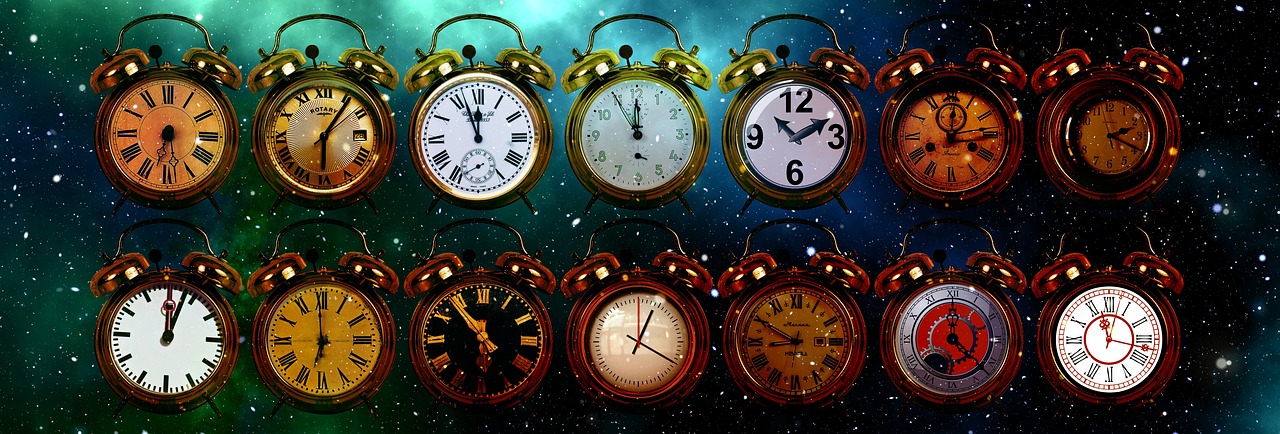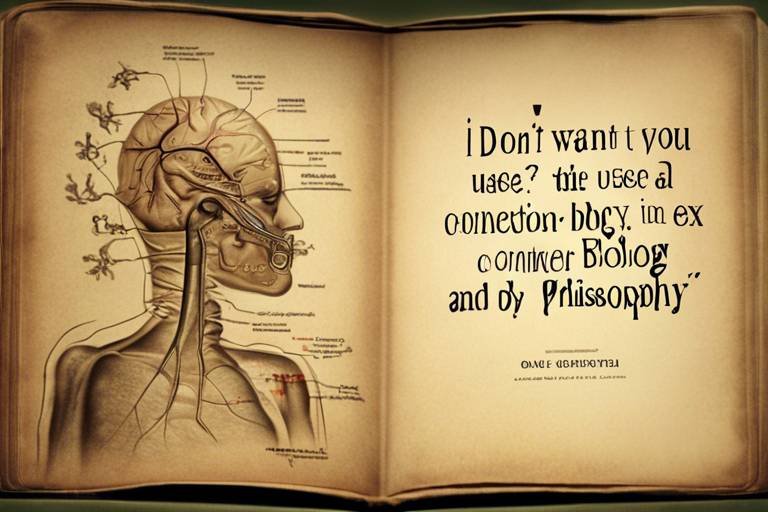Provoking Thoughts - Understanding the Philosophy of Time
Time is one of those concepts that seems simple at first glance, yet it holds a depth that can boggle the mind. Have you ever stopped to think about what time really is? Is it just a ticking clock, or is it something far more profound? This article explores various philosophical perspectives on time, examining its nature, implications, and how it shapes human experience and understanding throughout history. From the linear paths of Western thought to the cyclical views found in Eastern philosophies, time has been a source of fascination, debate, and even frustration for thinkers across cultures and eras.
When we talk about the nature of time, we’re diving into a pool of complexities that can leave even the most seasoned philosophers scratching their heads. At its core, time can be seen as linear, moving from the past, through the present, and into the future. This perspective is deeply ingrained in many Western cultures, where we often think of time as a straight line—like a river flowing steadily onward. But wait, what about those cultures that view time as cyclical? In places like India and ancient Greece, time is often seen as a repeating cycle, much like the seasons or the phases of the moon. This leads to fascinating questions: How do these differing perceptions of time affect the way we live our lives? Do they influence our values, our priorities, and even our relationships?
Philosophers have long grappled with the question of what time truly is. Several key theories have emerged, each offering a unique interpretation of time's existence and flow. Let’s explore a few of these theories, starting with presentism, which asserts that only the present moment is real. This theory raises intriguing implications for how we understand our experiences of the past and future. On the other hand, eternalism posits that past, present, and future events are all equally real, which can be both comforting and unsettling. And then there’s the growing block universe theory, which suggests that the past and present exist, but the future is yet to be determined. Each of these theories invites us to rethink our relationship with time.
Presentism is a captivating theory that focuses exclusively on the present moment. Imagine standing on a busy street corner, watching people rush by. In that moment, all that exists is the now—the sights, sounds, and feelings that envelop you. But what does this mean for our understanding of the past and future? If only the present is real, how do we make sense of our memories or our aspirations? Presentism challenges us to confront the nature of our experiences and how we perceive the flow of time.
Despite its intuitive appeal, presentism faces significant critiques. One major challenge comes from eternalism, which argues that if only the present is real, then how do we account for our memories? If the past is not real, what does that say about our experiences and the lessons we've learned? Critics argue that presentism can lead to a fragmented understanding of existence, as it seemingly dismisses the importance of past events and future possibilities.
However, supporters of presentism argue that it aligns closely with human perception. Think about it: our experiences are rooted in the present. We feel, think, and act in the now. This perspective resonates with our daily lives, where the present moment is all we truly experience. It makes sense that our reality is shaped by what we can perceive and interact with at any given moment. Presentism offers a framework that feels authentic, allowing us to navigate our lives with a focus on the here and now.
Now, let’s shift gears and explore eternalism. This theory suggests that all points in time—past, present, and future—are equally real. Imagine a vast tapestry where every thread represents a moment in time, woven together in a complex design. Eternalism challenges our conventional understanding of time, suggesting that just because we can’t see the future doesn’t mean it isn’t real. This perspective opens up fascinating discussions about fate, free will, and the nature of existence itself.
Time isn’t just a philosophical concept; it’s also deeply embedded in our psychology. Have you ever noticed how time seems to fly when you’re having fun but drags on during a boring lecture? This subjective experience of time can vary dramatically based on our emotions, activities, and even our age. For instance, children often perceive time as moving slowly, while adults may feel it speeding up. This phenomenon raises interesting questions about how our mental state influences our perception of time’s passage.
Time dilation is a concept that bridges physics and psychology. In physics, it refers to the idea that time can pass at different rates depending on speed and gravity. But in our everyday lives, we experience time dilation in more relatable terms. Think about a thrilling roller coaster ride versus waiting in line. The thrill makes time feel shorter, while the wait feels interminable. This duality highlights how our experiences shape our understanding of time, making it a fluid and dynamic concept.
Memory plays a critical role in how we perceive time. Our recollections of past events not only shape our understanding of what has happened but also influence our expectations for the future. When we think back to a significant moment in our lives, it’s as if we’re pulling a thread from that tapestry of time, weaving it back into our current reality. This relationship between memory and time is complex and multifaceted, reminding us that our understanding of time is not just a matter of ticking clocks, but also of the stories we carry with us.
Finally, let’s take a look at how different cultures interpret and value time. In many Western societies, time is often viewed linearly, where punctuality and deadlines reign supreme. But in contrast, cultures that embrace a more cyclical view of time may place greater emphasis on natural rhythms, seasons, and community gatherings. This divergence in perspectives can significantly impact social practices and rituals, shaping how we celebrate life’s milestones, from births to weddings to funerals. Understanding these cultural interpretations can enrich our appreciation of time and its role in our lives.
- What is the philosophical definition of time?
Time is often defined as a measurable period during which events occur, but philosophically, it can be seen as a complex interplay of past, present, and future experiences. - How do different cultures perceive time?
Cultures may view time as linear or cyclical, influencing their social practices, rituals, and even daily routines. - What is the difference between presentism and eternalism?
Presentism holds that only the present moment is real, while eternalism posits that past, present, and future events are all equally real. - How does memory affect our perception of time?
Our memories shape our understanding of past events and influence how we perceive the passage of time, often making it feel subjective.

The Nature of Time
Time is one of those fascinating concepts that can leave you scratching your head. What is it, really? Is it just a ticking clock, or is it something deeper? To understand the nature of time, we need to dive into its fundamental characteristics. Traditionally, we think of time as linear, flowing from the past, through the present, and into the future. This perspective is deeply ingrained in many cultures, where we often mark important events in a chronological order. Think of it like a river, continuously flowing, where each moment is a drop of water that moves forward.
However, not all cultures see time this way. Some embrace a cyclical view, where time is seen as a repeating cycle, much like the seasons. In these cultures, events are not just isolated incidents but part of a larger pattern that recurs over and over. For instance, in many Indigenous cultures, time is perceived as a circle, with the past, present, and future intertwining in a continuous loop. This perspective can be quite liberating, suggesting that our actions are part of a larger tapestry rather than just fleeting moments.
Interestingly, the way we measure time also varies significantly across cultures. While the Western world often relies on precise measurements—seconds, minutes, and hours—other cultures might use more fluid concepts of time. For example, some cultures prioritize natural indicators like the position of the sun or the changing of seasons, which can lead to a more relaxed approach to time management. This can create a fascinating contrast: while one culture races against the clock, another might take a leisurely stroll through the day, guided by the rhythms of nature.
To illustrate these differences, let's take a look at a simple comparison:
| Cultural Perspective | View of Time | Time Measurement |
|---|---|---|
| Western Cultures | Linear | Clock-based (hours, minutes) |
| Indigenous Cultures | Cyclical | Natural indicators (seasons, moon phases) |
This diverse perception of time raises intriguing questions about how we relate to our experiences. If time is linear, we might feel pressured to achieve milestones by certain ages. But if time is cyclical, we might find comfort in the idea that we can always start anew, as the seasons change. This duality can influence everything from our daily routines to our long-term goals.
As we explore these varying perceptions, it's essential to recognize how they shape our understanding of existence itself. Are we merely passengers on a one-way journey through time, or are we participants in a grand cycle that connects us to our ancestors and future generations? The philosophy of time invites us to ponder such questions, encouraging a deeper reflection on our place in the universe.
In conclusion, the nature of time is not just a scientific inquiry but a philosophical one that invites us to explore our beliefs, values, and the very essence of our human experience. Whether we see time as a linear path or a cyclical journey, it profoundly influences how we live, love, and remember.

Philosophical Theories of Time
When we dive into the , we’re not just scratching the surface of a mere concept; we’re exploring the very fabric of reality itself. Time is a slippery subject, and different thinkers have approached it from various angles, leading to fascinating interpretations. The three main theories that often come up in these discussions are presentism, eternalism, and the growing block universe. Each of these theories presents a unique perspective on how we understand time and its flow.
Presentism posits that only the present moment is real, suggesting that the past is merely a memory and the future is a mere possibility. This idea resonates with our everyday experiences, as we only ever truly experience the present. But what does this mean for our understanding of events that have occurred or those that are yet to come? If only the present is real, how do we reconcile our memories with the notion that the past no longer exists?
On the flip side, we have eternalism, which argues that past, present, and future events are all equally real. Think of it like a movie reel, where every frame exists simultaneously. This perspective challenges our intuitive understanding of time, suggesting that every moment is fixed and unchangeable. If we accept this view, how does it affect our decisions and our perception of free will? The implications are profound, leading to questions about destiny and the nature of existence itself.
Then there’s the growing block universe theory, which combines elements of both presentism and eternalism. It suggests that the past and present are real, while the future is not yet determined. This theory allows for the dynamic nature of time, where the universe is constantly 'growing' as new moments come into being. It raises intriguing questions about how we navigate time and change, and how our actions can influence what becomes real in the future.
To summarize, here’s a quick comparison of these theories:
| Theory | Key Concept | Implications |
|---|---|---|
| Presentism | Only the present is real | Challenges our understanding of memory and the past |
| Eternalism | All moments (past, present, future) are equally real | Questions of free will and determinism arise |
| Growing Block Universe | Past and present are real; future is not | Dynamic nature of time and influence of actions |
Each of these theories offers a different lens through which to view time, and engaging with them can be both enlightening and perplexing. It’s a bit like trying to catch smoke with your bare hands; the more you grasp, the more elusive it becomes. But isn’t that the beauty of philosophy? It invites us to question our assumptions and expand our understanding of the world around us.
- What is presentism? Presentism is the philosophical theory that only the present moment is real, and that the past and future do not exist in the same way.
- How does eternalism differ from presentism? Eternalism holds that all points in time—past, present, and future—are equally real, contrasting with presentism's focus solely on the present.
- What is the growing block universe theory? This theory posits that the past and present are real, while the future is not yet determined, suggesting a dynamic view of time.

Presentism
Presentism is a fascinating philosophical stance that asserts that only the present moment is truly real. This perspective invites us to ponder the nature of existence itself—what does it mean for something to "exist"? In the presentist view, past events are no longer real, and future events are not yet real; only the fleeting now holds any semblance of reality. It’s almost like being at a concert where the only song that matters is the one currently playing, while the past songs fade into memory and the future ones remain mere anticipation.
One of the most compelling aspects of presentism is how it resonates with our everyday experiences. Think about it: when we reflect on our memories, we do so through the lens of the present. Our emotions, thoughts, and actions are all anchored in the now. This immediacy shapes our interactions and influences how we perceive time itself. For instance, consider a moment of joy, like the birth of a child or a graduation ceremony. In those instances, the present moment feels overwhelmingly significant, eclipsing any thoughts of the past or future. This is the essence of presentism—our reality is a series of moments that we live in, one after another, like beads on a string.
However, presentism does not come without its challenges and critiques. Some philosophers argue that it struggles to account for the reality of past events and memories. If only the present is real, what happens to our recollections of experiences that shaped us? Can we truly say that a person’s life is defined only by their current state? This leads us to consider the implications of memory and experience in the context of presentism. How do we reconcile the importance of our past with a philosophy that seems to dismiss it?
Despite these criticisms, many find presentism appealing due to its intuitive nature. It aligns closely with how we experience life—after all, we live in a constant state of "now." Our decisions, relationships, and emotions are all tied to the present moment. This connection between presentism and human perception creates a compelling argument for its validity. It’s like navigating a river; while we can see the banks (the past) and anticipate the bends ahead (the future), we can only ever truly feel the water flowing around us in the present.
In summary, presentism offers a unique lens through which to view reality, emphasizing the significance of the present moment while raising profound questions about the nature of existence. As we delve deeper into the implications of this philosophy, we begin to understand not just how we perceive time, but how it fundamentally shapes our experiences as human beings.
- What is presentism? Presentism is the philosophical view that only the present moment is real, while the past and future do not exist.
- How does presentism affect our understanding of time? It emphasizes the significance of the present and suggests that our experiences and memories are anchored in the now.
- What are the critiques of presentism? Critics argue that presentism struggles to account for the reality of past events and the role of memory in our lives.
- Why do some people support presentism? Many find it intuitive and relatable, as it aligns with how we experience life and make decisions in the present.

Critiques of Presentism
While presentism offers a compelling view of reality, it is not without its critics. One of the most significant challenges to presentism comes from the perspective of eternalism. Eternalists argue that if only the present is real, then how do we account for the existence of past events that seem to have a lasting impact on our current reality? For instance, consider the memories we hold dear—are they merely illusions, or do they represent something more substantial? Critics contend that presentism struggles to adequately explain the continuity of our experiences and the way we relate to history.
Another critique revolves around the implications of presentism for our understanding of memory and experience. If the past is not real, then how do we reconcile our lived experiences with the concept of time? For example, when we recall a significant event from our childhood, we are not just accessing a fleeting moment; we are engaging with something that feels very real and impactful. Critics argue that presentism fails to capture the richness of human experience, which is often deeply intertwined with our recollections of the past.
Furthermore, presentism can appear to be counterintuitive when considering the scientific understanding of time. The laws of physics, particularly those concerning relativity, suggest that time is not strictly linear. This raises questions about how presentism can coexist with established scientific principles. For instance, if time is indeed relative and can be experienced differently based on speed and gravity, how does presentism accommodate these variations? Critics argue that the rigid structure of presentism may not align well with the fluidity observed in the physical universe.
In summary, while presentism provides an intuitive framework for understanding the present moment, it faces substantial critiques regarding its implications for memory, historical continuity, and compatibility with scientific theories. These challenges invite us to explore alternative perspectives on time, encouraging a deeper inquiry into what it means to exist in a temporal world.
- What is presentism? Presentism is the philosophical view that only the present moment is real, and both the past and future do not exist in any meaningful way.
- What are the main critiques of presentism? Critics argue that presentism fails to explain the reality of past events, struggles with the implications for memory and experience, and conflicts with scientific understandings of time.
- How does memory relate to presentism? Memory plays a crucial role in our understanding of time; if presentism is correct, it raises questions about the reality of our memories and their significance.
- What is eternalism? Eternalism is the philosophical view that past, present, and future events are equally real, challenging the presentist notion of time.

Support for Presentism
Support for presentism arises from its intuitive appeal and alignment with our everyday experiences. Imagine standing in a bustling café, where the aroma of coffee fills the air and the laughter of friends echoes around you. In that moment, everything you perceive—the sounds, the sights, the very sensations—exists only in the present. This immediacy is a cornerstone of presentism, asserting that only the present moment holds true reality. The past, while it shapes our identity and experiences, is merely a collection of memories, and the future is a realm of possibilities yet to unfold.
One of the strongest arguments for presentism is its resonance with human perception. We live our lives moment by moment, and our decisions are made based on the here and now. This perspective allows us to fully engage with our experiences without the distraction of what has been or what might come. For example, when we reminisce about a cherished memory, we do so through the lens of our current emotions and thoughts, effectively bringing the past into our present consciousness. In this way, presentism aligns closely with how we navigate our lives, emphasizing the importance of the now.
Moreover, presentism offers a coherent framework for understanding the flow of time. By positing that only the present is real, it simplifies the complexities associated with past and future events. The past can be seen as a series of snapshots that inform our current state, while the future remains a canvas of potentiality. This perspective not only aids in making sense of our experiences but also supports mental well-being by encouraging mindfulness—an essential practice in today’s fast-paced world.
Furthermore, presentism aligns with various philosophical and psychological theories that emphasize the significance of the present moment. For instance, in the realm of psychology, the concept of mindfulness encourages individuals to focus on the present, fostering a deeper connection to their thoughts and feelings. This connection can lead to improved mental health outcomes, reinforcing the notion that our understanding of time should prioritize the now.
In summary, the support for presentism is rooted in its intuitive grasp of human experience, its alignment with our perceptions, and its potential to enhance our understanding of time. By embracing the present, we not only acknowledge the reality of our immediate experiences but also cultivate a richer, more fulfilling existence. As we continue to explore the philosophy of time, presentism serves as a vital reminder of the significance of the moment we inhabit.
- What is presentism? Presentism is the philosophical view that only the present moment is real, while the past and future are not.
- How does presentism affect our understanding of time? Presentism simplifies the complexities of time by emphasizing the importance of the present, allowing us to engage fully with our experiences.
- Can presentism improve mental well-being? Yes, by encouraging mindfulness and a focus on the present, presentism can lead to improved mental health and a deeper connection to our experiences.

Eternalism
Eternalism is a fascinating philosophical theory that posits that all points in time—past, present, and future—are equally real. Imagine time as a vast landscape, where every moment exists simultaneously, much like a painting that captures every detail in a single frame. This perspective challenges our everyday understanding of time, where we often view it as a linear progression from past to present and into the future. Instead, eternalism invites us to consider a more complex tapestry of existence, where every moment is interwoven and significant, regardless of its position on the timeline.
One of the most intriguing implications of eternalism is how it reshapes our understanding of existence itself. If all moments exist simultaneously, then the events that we perceive as past are not merely memories fading into obscurity; they are as real as the current moment we are experiencing. This notion can be both comforting and unsettling. For instance, it suggests that our choices and actions are not confined to the present moment but are part of a larger continuum. Imagine being able to revisit any moment in your life, not just in memory but as a reality that exists in its own right. This idea can profoundly impact how we view our lives and the significance of our decisions.
Furthermore, eternalism raises compelling questions about causality and time travel. If every moment is equally real, would it be possible to traverse these moments? How would our understanding of cause and effect change if we could interact with the past or the future? These questions have captivated philosophers, scientists, and writers alike, leading to rich discussions in both theoretical and popular contexts.
In addition, eternalism has implications for our understanding of identity and change. Consider how we perceive ourselves over time. Many people believe that they are different individuals at different stages of their lives. However, if we adopt an eternalist viewpoint, every version of ourselves exists at once. This perspective can evoke a sense of continuity and connection with our past selves, allowing us to embrace our entire life story as a cohesive narrative rather than a series of disjointed events.
To better understand eternalism, let’s compare it with other philosophical theories of time:
| Theory | Key Characteristics |
|---|---|
| Eternalism | All moments (past, present, future) are equally real. |
| Presentism | Only the present moment is real; past and future do not exist. |
| Growing Block Universe | The past and present are real, but the future is not yet real. |
In summary, eternalism offers a rich and complex view of time that challenges our conventional understanding. By suggesting that all moments exist simultaneously, it invites us to rethink our relationship with time, identity, and existence. This philosophical perspective not only stretches our imagination but also deepens our appreciation for the intricate web of experiences that define our lives.
- What is eternalism? Eternalism is the philosophical theory that all points in time are equally real, suggesting that past, present, and future moments exist simultaneously.
- How does eternalism differ from presentism? Presentism asserts that only the present moment is real, while eternalism posits that all moments are equally real.
- What are the implications of eternalism for time travel? If all moments exist simultaneously, eternalism raises questions about the possibility of traversing time and interacting with different moments.
- How does eternalism affect our understanding of identity? Eternalism suggests that every version of ourselves exists at once, providing a sense of continuity and connection with our past selves.

The Psychological Experience of Time
The way we perceive time is a fascinating aspect of human psychology that can often feel like a rollercoaster ride. Have you ever noticed how a thrilling event can make time seem to fly by, while a boring lecture can stretch out like an eternity? This subjective experience of time is influenced by a myriad of factors, including our emotions, age, and even the activities we engage in. It’s as if our minds have their own clock, ticking at a different pace depending on the circumstances. This phenomenon raises intriguing questions about the nature of our existence: is time a fixed entity, or is it something we mold with our perceptions?
One of the most captivating concepts related to our psychological experience of time is time dilation. In physics, time dilation refers to the difference in elapsed time as measured by two observers, due to a relative difference in velocity or gravitational field. However, in our everyday lives, time dilation can manifest in more personal ways. For instance, when we are engaged in activities we love—like painting, playing music, or even spending time with friends—time seems to speed up. Conversely, during moments of stress or boredom, we often feel like time is dragging. This psychological time dilation can be attributed to our attention and focus: the more immersed we are in an activity, the less we notice the passing of time.
Moreover, our memories play a crucial role in shaping our perception of time. Have you ever looked back at a year and thought, "Wow, that went by so fast!" or "That was the longest year of my life!"? The way we remember events influences our understanding of how long they lasted. Our brain tends to create a narrative, stitching together memories into a cohesive timeline. This can lead to the illusion of time speeding up as we accumulate more experiences. For example, when we reflect on our childhood, it often feels like a distant past, while recent events seem much clearer and more immediate.
Interestingly, age also affects our experience of time. As we grow older, many people report that time seems to accelerate. This phenomenon can be explained by several psychological theories, including the proportional theory, which suggests that as we age, each year becomes a smaller fraction of our total life experience. For a five-year-old, one year is 20% of their life, but for a fifty-year-old, it’s only 2%. This shift in perspective can lead to the feeling that time is slipping away faster as we age.
To illustrate these concepts, consider the following table that summarizes how different factors can influence our perception of time:
| Factor | Effect on Time Perception |
|---|---|
| Emotions | Intense emotions can speed up or slow down our perception of time. |
| Age | Older individuals may perceive time as passing more quickly. |
| Attention | Focused attention on activities can create a sense of time dilation. |
| Memory | Rich memories can make time feel fuller and longer. |
In conclusion, the psychological experience of time is a complex interplay of our emotions, memories, and perceptions. It challenges us to rethink how we understand the passage of time and its impact on our lives. So, the next time you feel like time is racing or dragging, take a moment to reflect on what you’re feeling and experiencing. It’s a reminder that time is not just a ticking clock; it’s an intricate dance of our minds and hearts.
- Why does time feel like it speeds up as we get older? This is often attributed to the proportional theory, where each year becomes a smaller fraction of our lives.
- What is time dilation? Time dilation refers to the perceived difference in the passage of time, influenced by factors like focus and emotional state.
- How do memories affect our perception of time? Our recollections can make time feel longer or shorter based on how rich or significant those memories are.

Time Dilation
Time dilation is a fascinating concept that stretches the boundaries of our understanding of time itself. It arises from the theory of relativity, proposed by Albert Einstein, which fundamentally changed how we perceive time and space. Simply put, time dilation refers to the difference in the elapsed time as measured by two observers, due to a relative difference in velocity or gravitational field between them. Imagine two twins: one stays on Earth while the other travels in a spaceship at near-light speed. When the traveling twin returns, they find that less time has passed for them compared to their sibling on Earth. This isn’t just a wild science fiction story; it’s a reality backed by rigorous scientific evidence!
The phenomenon can be categorized into two main types: velocity-based time dilation and gravitational time dilation. The former occurs due to the effects of traveling at significant fractions of the speed of light, while the latter is a result of the influence of gravity on time. According to Einstein’s general relativity, the stronger the gravitational field, the slower time passes. This means that time runs slightly faster on the International Space Station, which orbits Earth in a weaker gravitational field, than it does on the surface of our planet. Isn’t it mind-boggling to think that time can actually tick at different rates depending on where you are in the universe?
To illustrate this concept further, let’s consider a simple table comparing the effects of velocity and gravity on time dilation:
| Type of Time Dilation | Cause | Example |
|---|---|---|
| Velocity-based | High speeds approaching the speed of light | A spaceship traveling at 90% the speed of light |
| Gravitational | Strong gravitational fields | Time on Earth vs. time on the ISS |
This concept of time dilation not only has implications in theoretical physics but also in practical applications. For instance, the Global Positioning System (GPS) satellites must account for time dilation to provide accurate location data. The clocks on these satellites tick slightly faster than those on Earth due to their velocity and the weaker gravitational field in orbit. If engineers didn’t adjust for this discrepancy, GPS would quickly become inaccurate, leading to significant errors in navigation. This shows how deeply intertwined our understanding of time is with technology and everyday life.
But what about our psychological experience of time? Time dilation also manifests in our subjective experience. Have you ever noticed how time seems to fly when you’re having fun, yet drags on during a boring meeting? This perception is influenced by various factors, including emotional states, attention, and memory. For instance, during stressful or traumatic events, time can feel like it slows down, as if your brain is processing every detail in real-time. In contrast, during joyful moments, our brains may gloss over details, leading to a sense that time has passed quickly. This subjective experience of time is a reminder that while physics gives us a framework for understanding time, our personal experiences add layers of complexity to this fundamental concept.
In conclusion, time dilation is not just an abstract scientific theory; it’s a phenomenon that affects our understanding of reality and our day-to-day lives. It challenges our perceptions and invites us to ponder profound questions about the nature of existence. As we delve deeper into the mysteries of time, we find that our experience of it is as fluid and dynamic as the universe itself.
- What is time dilation? Time dilation is the difference in elapsed time as measured by two observers, due to a relative difference in velocity or gravitational field.
- How does velocity affect time? As an object approaches the speed of light, time for that object slows down relative to an observer at rest.
- What is gravitational time dilation? It refers to the phenomenon where time passes slower in stronger gravitational fields.
- How does time dilation affect GPS? GPS satellites must account for time dilation due to their speed and weaker gravitational field to maintain accuracy.

Memory and Time
Memory and time are intricately intertwined, shaping how we perceive our past and navigate our present. Imagine time as a river, flowing constantly, while our memories act as stones scattered along its banks. Each stone represents a moment, a cherished experience, or a lesson learned, contributing to the landscape of our lives. But how does this interplay between memory and time influence our understanding of existence?
To delve deeper, we must consider how memories are formed and how they can alter our perception of time. When we experience something significant—whether it's a joyous occasion like a wedding or a tragic event like a loss—those moments tend to stand out in our minds. They create a time capsule effect, allowing us to revisit feelings and sensations long after the moment has passed. This phenomenon can make time feel elastic; it can stretch during moments of joy and contract during periods of sorrow.
Interestingly, our perception of time isn’t just about the events themselves, but also how we remember them. For instance, research suggests that the more emotional an event is, the more vivid our memory of it becomes. This leads to a fascinating question: does the emotional weight of a memory actually alter our perception of time? In some cases, it seems to do just that. A thrilling adventure might feel like it lasted an eternity, while a mundane day might slip away in the blink of an eye.
Furthermore, our memories can distort the flow of time. Have you ever noticed how a long vacation can feel like it lasted weeks, while a single workday can feel like it dragged on for ages? This is because our brain processes memories differently based on the richness of the experience. When we engage fully in an experience, our brain records more details, making that time feel longer in retrospect. Conversely, when we go through the motions of daily life without much thought, those moments tend to blur together, making time feel fleeting.
Another fascinating aspect is the concept of nostalgia. Nostalgia can be a powerful force, often making us yearn for the past. It can create a sense of longing for moments that, while they may have been fleeting, were filled with joy and meaning. This emotional connection can warp our perception of time, making us believe that the past was better or more significant than the present. In this way, memory acts as a lens through which we view time, coloring our experiences and shaping our reality.
In summary, the relationship between memory and time is complex and multifaceted. Our memories not only reflect our past experiences but also influence how we perceive the present and anticipate the future. Understanding this relationship can help us appreciate the moments we live and the memories we create, ultimately enriching our journey through time.
- How do memories affect our perception of time? Memories can alter our perception of time by making certain experiences feel longer or shorter based on their emotional significance.
- Can nostalgia change how we view the past? Yes, nostalgia can create a longing for the past, often making it seem better or more significant than the present.
- What role do emotions play in memory formation? Emotions enhance memory formation, making emotionally charged events more vivid and easier to recall.

The Cultural Interpretations of Time
Time is a fascinating concept, but did you know that different cultures interpret it in radically different ways? In the West, we often view time as a linear progression, like a straight road stretching into the distance. We celebrate birthdays, mark anniversaries, and plan our futures based on this linearity. However, in many Eastern cultures, time is perceived as cyclical, a repeating cycle of seasons and life stages, akin to the ebb and flow of the tides. This divergence in understanding shapes not only how we live our lives but also how we approach our relationships, responsibilities, and rituals.
For instance, in cultures that embrace a linear view of time, such as those in the United States and much of Europe, punctuality is highly valued. Being late is often considered disrespectful, as it disrupts the planned flow of the day. In contrast, many Indigenous cultures and some Asian societies adopt a more fluid approach to time. Here, the emphasis is on the moment rather than the clock. Social gatherings may start late, but the focus is on connection rather than adherence to a schedule. This difference can lead to misunderstandings, especially in cross-cultural interactions, where one party may prioritize time management while the other values relational engagement.
Another interesting aspect of cultural interpretations of time is the way rituals and traditions are timed. For example, in Western cultures, rituals like New Year's Eve celebrations are tied to the calendar, marking the end of one year and the beginning of another in a linear fashion. Meanwhile, in many Indigenous cultures, ceremonies may be held based on natural cycles, such as the solstices or equinoxes, emphasizing a connection to the earth and its rhythms. These practices reinforce the idea that time is not just a measurement, but a cultural construct that informs identity and community.
Moreover, the perception of time can significantly influence social practices. In cultures that view time as cyclical, there is often a greater emphasis on community and collective experiences. Events may be celebrated as part of a larger cycle, fostering a sense of belonging and continuity. On the other hand, linear time cultures may prioritize individual achievements and milestones, leading to a more competitive atmosphere. This can affect everything from work environments to educational systems, shaping how people relate to one another.
To highlight these differences, consider the following table that summarizes the contrasting views of time in various cultures:
| Cultural Context | Linear Time Perspective | Cyclical Time Perspective |
|---|---|---|
| Examples | United States, Germany | Indigenous cultures, Hinduism |
| Focus | Future planning and deadlines | Traditions and natural cycles |
| Punctuality | Highly valued | Flexible |
| Social Gatherings | Scheduled events | Fluid, based on community needs |
In conclusion, the way we interpret time is deeply rooted in our cultural backgrounds. Understanding these differences not only enriches our perspective but also fosters greater empathy and cooperation in our increasingly interconnected world. So, next time you find yourself waiting for a friend who’s running late, consider that their relationship with time may just be a bit different from yours. After all, time is not just about clocks and calendars; it’s about how we choose to live our lives within the moments we have.
- How does culture affect our perception of time? Different cultures have unique ways of interpreting and valuing time, influencing social behaviors and practices.
- What are the implications of viewing time as linear versus cyclical? Linear views often emphasize punctuality and individual achievements, while cyclical views promote community and connection.
- Can understanding cultural interpretations of time improve relationships? Yes, being aware of these differences can foster empathy and improve communication in diverse settings.
Frequently Asked Questions
- What is the nature of time?
Time is often viewed as a linear progression from past to present to future. However, different cultures and philosophies interpret time in various ways, including cyclical theories where time is seen as a repeating cycle. Understanding these perspectives helps us grasp how time shapes our experiences and influences our lives.
- What are the main philosophical theories of time?
The primary theories include presentism, which posits that only the present is real; eternalism, which argues that past, present, and future events are equally real; and the growing block universe theory, which suggests that the past and present exist, but the future does not yet. Each theory offers unique insights into how we perceive and understand time.
- How does presentism differ from eternalism?
Presentism asserts that only the current moment is real, meaning that past and future events do not exist in any real sense. Eternalism, on the other hand, holds that all points in time are equally real, which challenges our traditional understanding of time's flow. This fundamental difference affects how we think about memory, existence, and our experiences.
- What is time dilation?
Time dilation is a phenomenon that occurs in physics, particularly in the theory of relativity, where time appears to pass at different rates depending on relative speed or gravitational fields. Psychologically, it refers to how our perception of time can change based on emotions or experiences, making certain moments feel longer or shorter.
- How do memory and time relate to each other?
Memory plays a crucial role in our understanding of time. Our recollections influence how we perceive the passage of time, often making it feel like it has sped up or slowed down. The way we remember events can also shape our expectations and experiences of future moments, creating a complex relationship between memory and our perception of time.
- How do different cultures interpret time?
Cultural interpretations of time vary widely. Some cultures view time linearly, emphasizing schedules and punctuality, while others embrace a cyclical understanding, celebrating the natural rhythms of life. These differing views can influence social practices, rituals, and even daily interactions, highlighting the diverse ways humanity engages with time.



















